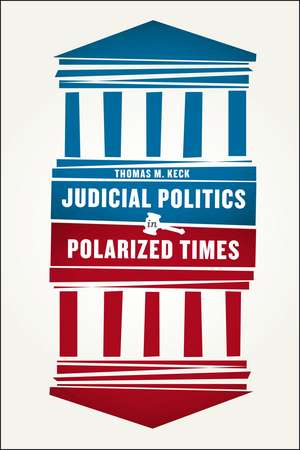Judicial Politics in Polarized Times
Autor Thomas M. Kecken Limba Engleză Paperback – 18 dec 2014
Preț: 186.18 lei
Nou
Puncte Express: 279
Preț estimativ în valută:
35.63€ • 36.81$ • 29.65£
35.63€ • 36.81$ • 29.65£
Carte disponibilă
Livrare economică 04-18 martie
Livrare express 15-21 februarie pentru 29.32 lei
Preluare comenzi: 021 569.72.76
Specificații
ISBN-13: 9780226182414
ISBN-10: 022618241X
Pagini: 352
Ilustrații: 12 tables
Dimensiuni: 152 x 229 x 23 mm
Greutate: 0.5 kg
Editura: University of Chicago Press
Colecția University of Chicago Press
ISBN-10: 022618241X
Pagini: 352
Ilustrații: 12 tables
Dimensiuni: 152 x 229 x 23 mm
Greutate: 0.5 kg
Editura: University of Chicago Press
Colecția University of Chicago Press
Notă biografică
Thomas M. Keck is the Michael O. Sawyer Chair of Constitutional Law and Politics at Syracuse University’s Maxwell School of Citizenship and Public Affairs. He is the author of The Most Activist Supreme Court in History, also published by the University of Chicago Press.
Cuprins
Introduction Three Stories about Courts
Part I Rights on the Left, and Rights on the Right
One Rights on the Left
Two Rights on the Right
Part II Courts, Democracy, and Policy Change
Three Are Judges Umpires?
Four Are Judges Tyrants?
Five Are Judges Sideshows?
Conclusion Judicial Politics in Polarized Times
Appendix A Coding Procedures for Polarization Analysis
Notes
References
Index
Online at http://press.uchicago.edu /sites/keck /
Appendix B Judicial Decisions Coded for Polarization Analysis
Appendix C Congressional Votes Coded for Polarization Analysis
Recenzii
“This is a robust, measured, and ultimately very persuasive book that places judicial review in the United States in context, insisting—and providing compelling evidence to support—the conclusion that judicial review is neither savior nor threat. It is, instead, a vital and still-important cog in our government machinery. Judicial Politics in Polarized Times could not be more timely, and I have no doubt that it will not only be a starting point for conversations about whether or not judicial review has a place in the American political system but actually help us move forward from that debate.”
"Keck explores litigation surrounding some of today's most contentious issues—gay rights, abortion, affirmative action, and gun rights. In doing so, he demonstrates that judicial decisions on these topics are part of—rather than antithetical to—democratic politics. Courts, Keck shows, are rarely imposing minority viewpoints on unwilling citizens and their elected representatives. Instead, courts are simply part of a broader system of push-and-pull, in which policy develops at multiple levels of government, across branches, and through a variety of mechanisms. Keck reorients our analysis to yield a more textured—and ultimately more realistic—picture of the role of courts and litigation today."
"A data-rich study of the complex and fascinating interplay between court decisions and movements for and against policy change in four politically polarized areas. The result is a provocative challenge to long-held and deeply cherished arguments for and against judicial review."
“Keck provides an important and timely discussion of judicial politics in this era of political polarization. . . . The book is incredibly detailed, . . . and Keck focuses on the leading issues of today’s political discourse, such as gay rights and gun control, which helps make his argument more persuasive. . . . Highly recommended.”
"Drawing on a sweeping survey of litigation on abortion, affirmative action, gay rights, and gun rights across the Clinton, Bush, and Obama eras, Keck argues that, despite judges’ claims, actual legal decisions are not the politically neutral products of disembodied legal texts. But neither are judges 'tyrants in robes,' undermining democratic values by imposing their own preferences. Ultimately, Keck concludes, judges respond not simply as umpires, activists, or
political actors, but in light of distinctive judicial values and practices."
political actors, but in light of distinctive judicial values and practices."
“In its comprehensiveness, its rigorous impartiality, and its careful, nuanced consideration of important normative questions about the role of courts in the contemporary United States, Keck’s book is model scholarship on judicial politics, worthy of the highest praise.”
“Keck offers an insightful analysis of partisan politics and the judiciary in polarized times. . . . [His] analysis and research are balanced. And his discussion sheds light on what drives the constant onslaught of difficult culturally-charged lawsuits. . . . Those interested in the judicial-appointment process and the problems with partisan judging, those handling cases in the courts studied, and those who want to know more about hot-button issue litigation, will find this book extremely useful. I highly recommend it.”
